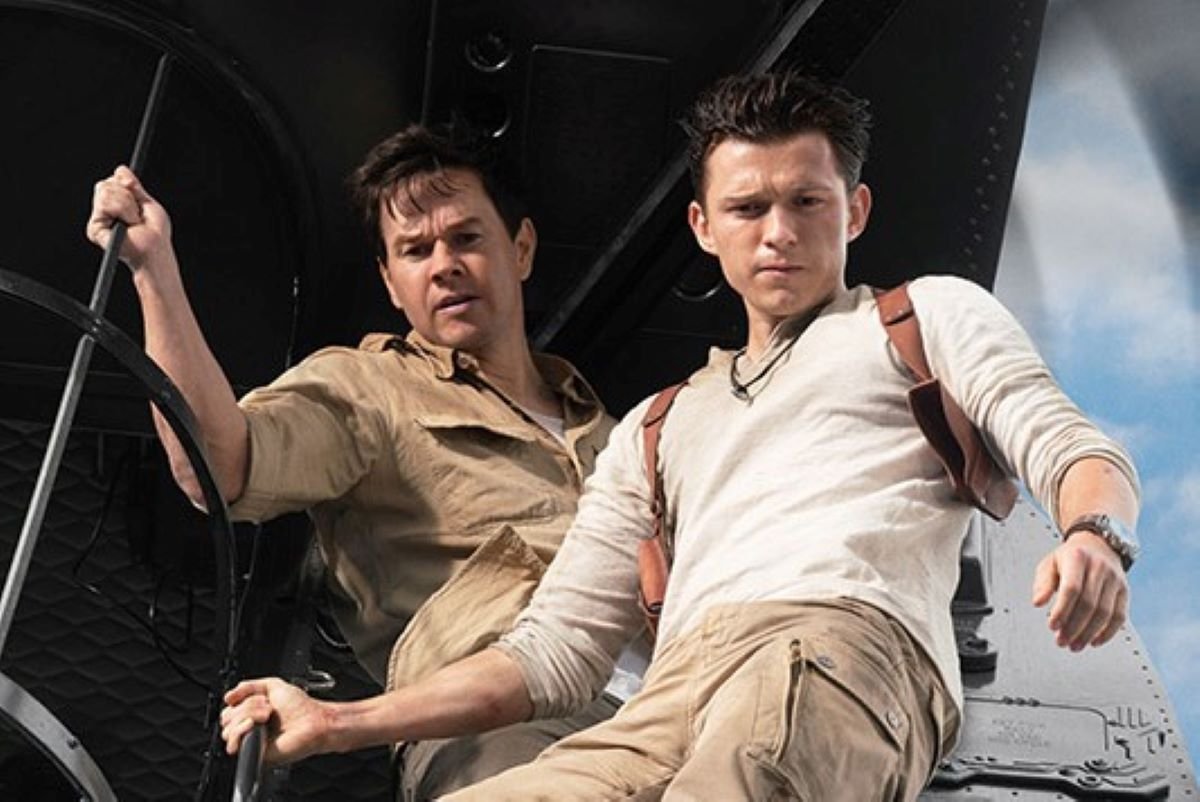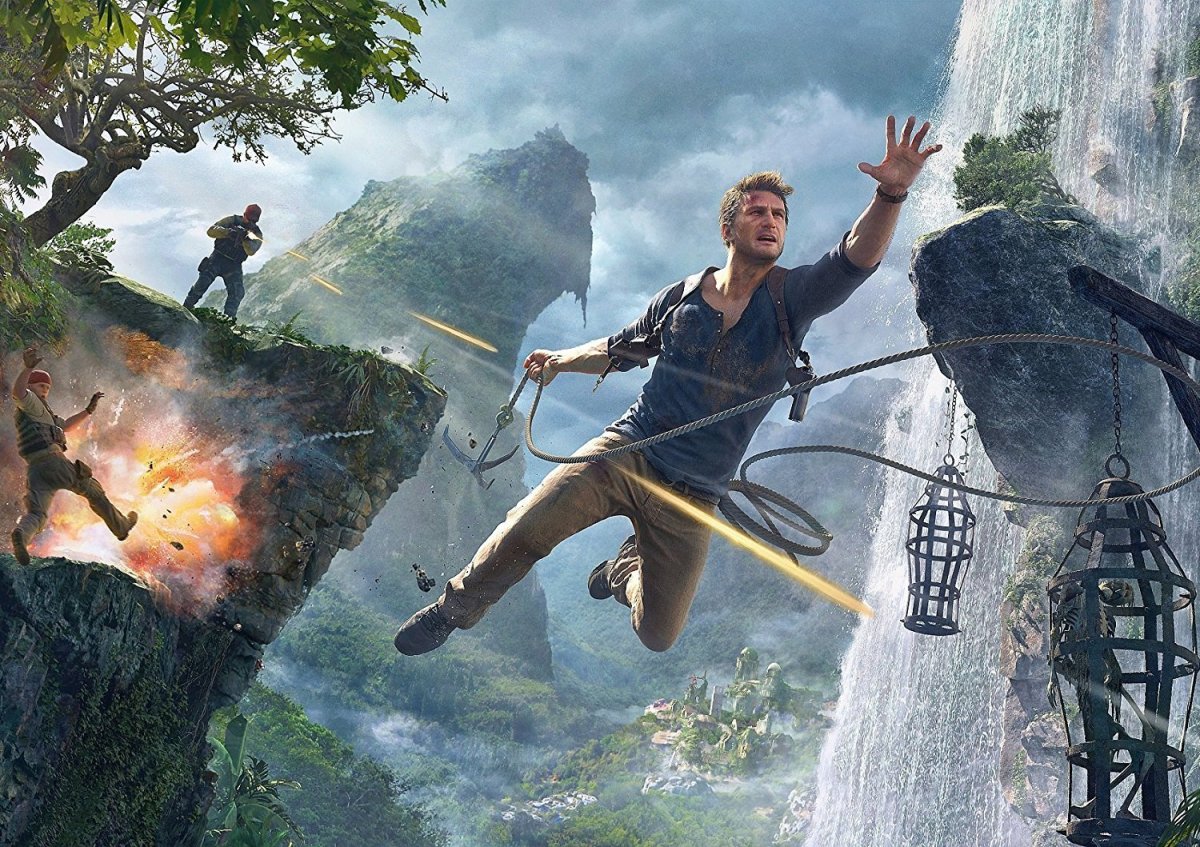With the Uncharted movie, Sony is aiming to kick-start a new trend of adapting its own video game properties for the big screen.
Starring Tom Holland as Nathan Drake and Mark Wahlberg as his mentor Sully, the film is PlayStation Productions' debut offering.
This new studio will also be turning The Last of Us into a prestige TV series later this year and is hoping to give the cinematic treatment to Ghost of Tsushima as well.
Given these big ambitions, it's important that Uncharted gets off on the right foot with gamers and general filmgoers alike. After all, if it's a major flop then it might lead to some of the other Sony projects being cancelled before they even have a chance.
**Warning: This article contains spoilers for the Uncharted movie**
Unfortunately, the new movie has not gotten off to the most auspicious start as far as critics are concerned, with it currently sitting at a paltry 42% on Rotten Tomatoes.
It's been ridiculed for everything from its miscast leads to its familiar screenplay and pedestrian action sequences.
Whether mainstream audiences have the same reaction or not remains to be seen but, one thing you can always rely on is that fans of the original video games will be ready to scrutinize every last detail of a movie adaptation.
On that note, if you were wondering how well the film stacks up against its source material, here's everything you need to know.
A Pale Imitation
When Holland was first announced to be playing Nathan Drake it seemed like an odd choice, not least because the actor is too young to play the character as he is presented in the games.
Nate is in his early thirties when gamers first meet him, and by the end of the series he is 38 (not counting the epilogue for Uncharted 4: A Thief's End).
Granted, it's clear why Holland was chosen for the role: He's young enough to hold up a long-standing franchise, and he is an immediate draw for audience members of a certain demographic thanks to his role as Spider-Man.
The Uncharted games do feature flashbacks to a young Nate so it's not like fans of the original are incapable of imagining him at a younger age, it's just that Holland is not the right fit for the character regardless of this factor.
Holland portrays Nate as a slightly awkward geek with a penchant for history lessons and some skills with thievery, and, while there's nothing wrong with that per se, in the games Nate is more self-assured, he's cocky and always has a plan (even if he doesn't quite know what it is yet).
Given the way Holland portrays Nate it's hard not to see the character as just being an extension of Peter Parker, he feels like an iteration of the teen who has decided to go off on adventures rather than be a friendly neighbourhood Spider-Man.
He's passable in the role, but it's obvious he just doesn't have quite the same charisma as his virtual counterpart.
A Not-So-Helpful Mentor
Now, even if Holland has his flaws at least he isn't as poorly cast as Wahlberg is as Nate's mentor Sully.
It's through Sully that Nate is supposed to learn to become a capable treasure hunter, but Wahlberg has made the character brash and belligerent, and he is constantly trying to one-up Nate rather than be the father-figure he is in the games.
There is an argument to be had that because the film is set before the events of the games there is room for the characters to not be exactly as we know them, but even then Wahlberg's performance just doesn't seem to work.
Sully is supposed to be a mentor to Nate and a semi-father figure, they may have banter with each other in the games but there's a difference between joking around and just being plain mean to each other, like how he is with Nate in the film.
Wahlberg has made the character incredibly unlikeable and that just further hinders his portrayal, especially when compared to the original.

The Sense of Adventure
While the depictions of its central duo might not be to everybody's taste, one thing that has been accurately translated to the screen is the adventure-serial vibe of the Uncharted games.
The movie just takes disparate narrative beats from across the tetralogy, mixes them all together and then shuffles them around for good measure. The flashback to Nathan's adolescent upbringing in a boys' home is lifted directly from the fourth game, as is the auction heist and the general idea of embarking on a quest to find a missing pirate ship.
Meanwhile, the third installment is represented with the opening set piece — in which our hero desperately clings onto airborne cargo as it flaps around in the slipstream of a plane — and the Chloe Frazer dynamic has been pinched from Uncharted 2.
In that sense, the storyline is actually one of the more faithful aspects of this adaptation, in the sense that a lot of it has just been directly copied from the games. Even the bits that are original here feel like they could have been taken from one of the PlayStation outings, as was the case with the extended puzzle sequence in Barcelona.
That being said, if this narrative was featured in one of the video games it would still be a lesser entry. There's isn't any of the complex relationship drama of Uncharted 4, the surprise creature-feature twist of Drake's Fortune, or the monumental stakes of Among Thieves. Instead, it's just a bog-standard scavenger hunt without any interesting wrinkles.
Even the treasure itself is a little prosaic when compared to its video game counterparts, as it's just a horde of regular gold. In the first Uncharted, Nathan is searching for the fabled El Dorado, while in the third one he is following the trail of Lawrence of Arabia as he tries to locate the Iram of the Pillars. As for Uncharted 4, which is arguably closest to the movie, that epic has him scouring the globe for Libertatia, a colony where pirates supposedly pooled all of their treasure and then turned on one another.
A measly deposit of gilded coins and some rickety ships just feel a little underwhelming in comparison, especially since there's no supernatural curse to go along with it.
The Lack of a Supernatural Threat
Speaking of which, it is kind of a tradition for the Uncharted games to end with a surprise detour into horror. While they tend to start off quite grounded, they usually culminate with encounters against yetis, subterranean cannibals, immortal beings, or malevolent spiders.
It's a way of escalating the stakes and is clearly inspired by the Indiana Jones series. With that being said, it would feel like a bit anticlimactic if the Nazis opened the ark of the covenant at the end of Raiders, only to find some dusty old tablets and nothing else.
Granted, the new Tom Holland movie never teases that there is a mystical element at play with its treasure hunt, but it still feels like a key piece of the puzzle is missing. The Uncharted franchise is explicitly supernatural and one of its defining traits is how it weaves real history together with more fantastical elements.
Again, taking that part away just makes it needlessly generic and dull. Even the fourth game, which doesn't have any monsters, had the foresight to chuck in a few improbable booby-traps and exploding skeletons.

The Big Set-Pieces
In addition to likeable characters and gripping storylines, Uncharted is best known for delivering showstopping action set-pieces that make you feel as though you are playing through a mega-budget film.
Rather than just stringing along a procession of banal firefights, the games keep devising different scenarios to keep you on your toes. They'll have you performing daring feats like scaling a derailed train that is hanging precariously over the edge of a cliff, leaping between vehicles in high-octane car chases, and trying to escape from a capsizing ship.
Brought to life with stunning animations and fluid controls, these are some of the most exhilarating moments in the gaming medium. Quite frankly, they're also a lot more engaging than anything you'll see in the new movie.
If the appeal of the Uncharted games is that they're meant to replicate the experience of starring in your very own Hollywood blockbuster, then its cinematic adaptation needed to make you feel like you were doing more than just vicariously enjoying somebody's else's playthrough.
The obvious way of doing this would be to put a heavy emphasis on practical effects and in-camera stunt work (like the recent Mission Impossible sequels), because that's something that the PlayStation titles fundamentally cannot do.
For instance, it's easy to envision a more thrilling version of that opening plane scene where there's a genuine sense of peril and it doesn't look like it's all been filmed against a greenscreen with unconvincing digi-doubles.
Unfortunately, while the movie's action sequences do manage to get the basics down (there's lots of running, jumping, climbing and collapsing structures), they're not much more than lifeless facsimiles of better scenes from the video games.
Your Only As Good As Your Villains
Another aspect of the Uncharted film that seems to be a lifeless facsimile of the original franchise are the villains.
This seems like it shouldn't be possible given Antonio Banderas is the one portraying the film's main antagonist, and to be fair he is quite good in the role its what the story does to his character that is the problem.
Banderas' Santiago Moncada is intimidating and has a presence so menacing that he is by far the best character in the whole film, the problem is he isn't in it for long.
In a twist that was intended to be shocking, Moncada is done away with by his second-in-command Braddock (Tati Gabrielle) to reveal her as the real big-bad of the production, but in comparison she just falls flat.
Sure, Braddock is skilled with a blade and can fight off any person who stands in her way but she's just not got the same sinister nature as Moncada, or classic Uncharted villains like Rafe Adler or Zoran Lazarevic.
Moncada had all the makings of a good Uncharted villain, he had the right motivations and the menacing aura, and if he'd had a chance to go head-to-head against Nate then they could have had an epic showdown like the one between the treasure hunter and Rafe in Uncharted 4.
It's even more of a shame they didn't choose to go down this route because they had the perfect setting to recreate said fight, which saw Nate and Rafe engage in a sword fight on a pirate ship as it burns down.
But, because he was ditched so early in favor of another, less interesting villain it just made the whole thing feel, well, pointless.
Uncharted is out in theaters across the U.S. now.
Uncommon Knowledge
Newsweek is committed to challenging conventional wisdom and finding connections in the search for common ground.
Newsweek is committed to challenging conventional wisdom and finding connections in the search for common ground.
About the writer
Roxy Simons is a Newsweek TV and Film Reporter (SEO), based in London, U.K. Her focus is reporting on the ... Read more





